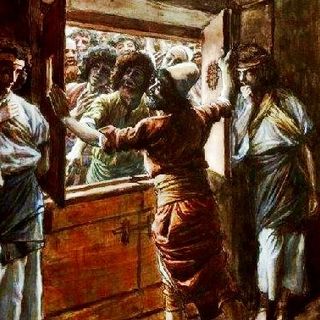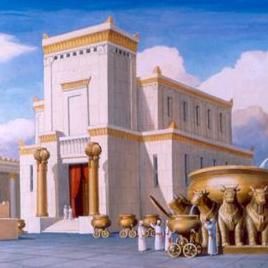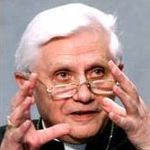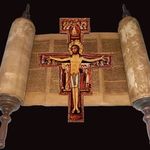Torah and Gospel

"Do not think that I came to destroy the Law or the Prophets. I did not come to destroy but to fulfill. For assuredly, I say to you, till heaven and earth pass away, one jot or one tittle will by no means pass from the law till all is fulfilled." (Mat 5:17-19)
Articles on the relationship between the Torah and the Gospel, and on the relationship between Messianic Jews, Jewish Christians, Hebrew-Catholics and Catholic Jews and the Jewish commandments.
- Details
- Written by: Lawrence Feingold
- Category: Torah and Gospel
 Do the sacramental rites of the Old Testament continue to have value after Calvary? This controversial question has been answered in very different ways in the history of the Church. In recent decades, there has been a widespread change of perspective due to many factors including the Holocaust, the Second Vatican Council's Nostra Aetate, the rejection of more radical forms of supersessionism, the spread of messianic Jewish congregations, and the practice of participation in the Passover seder in parishes.
Do the sacramental rites of the Old Testament continue to have value after Calvary? This controversial question has been answered in very different ways in the history of the Church. In recent decades, there has been a widespread change of perspective due to many factors including the Holocaust, the Second Vatican Council's Nostra Aetate, the rejection of more radical forms of supersessionism, the spread of messianic Jewish congregations, and the practice of participation in the Passover seder in parishes.
- Details
- Written by: Antoine Lévy
- Category: Torah and Gospel
 How are Catholic preachers supposed to reconcile the legitimation of military violence in Deuteronomy with the Gospel’s celebration of childlike meekness? If ignoring this dilemma is the option of cowards... contrasting the peaceful spirit of the New Testament with the violent teachings of the Old is theologically perilous.
How are Catholic preachers supposed to reconcile the legitimation of military violence in Deuteronomy with the Gospel’s celebration of childlike meekness? If ignoring this dilemma is the option of cowards... contrasting the peaceful spirit of the New Testament with the violent teachings of the Old is theologically perilous.
Read more: Childlike Innocence or Just War? Reconciling the New Testament with the Old
- Details
- Written by: Dr. Norman Lamm
- Category: Torah and Gospel
 In remaining true to the sources of Jewish tradition, Jews are commanded to avoid the madness that seizes society at various times and in many forms, while yet retaining a moral composure and psychological equilibrium sufficient to exercise that combination of discipline and charity that is the hallmark of Judaism.
In remaining true to the sources of Jewish tradition, Jews are commanded to avoid the madness that seizes society at various times and in many forms, while yet retaining a moral composure and psychological equilibrium sufficient to exercise that combination of discipline and charity that is the hallmark of Judaism.
- Details
- Written by: Encyclopaedia Judaica
- Category: Torah and Gospel
 Among the sexual perversions proscribed as criminal offenses in the moral code of the Torah are homosexual relations between males (Lev. 18:22). Talmudic law extends the prohibition also to lesbianism. Rabbinic sources advance various reasons for the strict ban on homosexuality, which is regarded as a universal law included among “the Seven Commandments of the Sons of Noah.”
Among the sexual perversions proscribed as criminal offenses in the moral code of the Torah are homosexual relations between males (Lev. 18:22). Talmudic law extends the prohibition also to lesbianism. Rabbinic sources advance various reasons for the strict ban on homosexuality, which is regarded as a universal law included among “the Seven Commandments of the Sons of Noah.”
- Details
- Written by: Richard Reinhardt
- Category: Torah and Gospel
 A Temple is a seat of Divine Presence. In Judaism, there are two Temples, one for the dimension of time, the Sabbath, and one for the dimension of space, the Temple in Jerusalem. Christianity adds a third, the Son of G-d incarnate in the nature of man.
A Temple is a seat of Divine Presence. In Judaism, there are two Temples, one for the dimension of time, the Sabbath, and one for the dimension of space, the Temple in Jerusalem. Christianity adds a third, the Son of G-d incarnate in the nature of man.
- Details
- Written by: Richard Reinhardt
- Category: Torah and Gospel
 It seems to me that a Catholic cannot help but be a crass supersessionist unless he recognizes the value that keeping the Law of Moses can have for the Jew who would serve G-d as He revealed Himself through His Incarnate Son.
It seems to me that a Catholic cannot help but be a crass supersessionist unless he recognizes the value that keeping the Law of Moses can have for the Jew who would serve G-d as He revealed Himself through His Incarnate Son.
- Details
- Written by: Joseph Cardinal Ratzinger
- Category: Torah and Gospel
 The history of the relationship between Israel and Christendom is drenched with blood and tears. It is a history of mistrust and hostility, but also - thank God - a history marked again and again by attempts at forgiveness, understanding and mutual acceptance... Can Christian faith, left in its inner power and dignity, not only tolerate Judaism but accept it in its historic mission? Or can it not? Can there be true reconciliation without abandoning the faith, or is reconciliation tied to such abandonment?
The history of the relationship between Israel and Christendom is drenched with blood and tears. It is a history of mistrust and hostility, but also - thank God - a history marked again and again by attempts at forgiveness, understanding and mutual acceptance... Can Christian faith, left in its inner power and dignity, not only tolerate Judaism but accept it in its historic mission? Or can it not? Can there be true reconciliation without abandoning the faith, or is reconciliation tied to such abandonment?
- Details
- Written by: Richard Reinhardt
- Category: Torah and Gospel
 There are no disagreements between Judaism and Catholicism. Where their teachings diverge, it is because they apply to two different, well, let’s call them universes, two ways that human experience is unified (uni-verse, “turned into one”) in relation to G-d according to their respective covenants.
There are no disagreements between Judaism and Catholicism. Where their teachings diverge, it is because they apply to two different, well, let’s call them universes, two ways that human experience is unified (uni-verse, “turned into one”) in relation to G-d according to their respective covenants.
- Details
- Written by: Cardinal Jean-Marie Lustiger, ז"ל
- Category: Torah and Gospel
 From Cardinal Jean-Marie Lustiger's Book 'The Promise':"The Church appears in Jerusalem, after Pentecost, as an "assembly" kahal in Hebrew, ecclesia in Greek. it is unthinkable that she would claim to replace Israel. She is not another Israel, but the very, fulfillment, in Israel, of God's plan..."
From Cardinal Jean-Marie Lustiger's Book 'The Promise':"The Church appears in Jerusalem, after Pentecost, as an "assembly" kahal in Hebrew, ecclesia in Greek. it is unthinkable that she would claim to replace Israel. She is not another Israel, but the very, fulfillment, in Israel, of God's plan..."
- Details
- Written by: Richard Reinhardt
- Category: Torah and Gospel
 The commandments of the Law of Moses require both interior and exterior acts. There are commandments which pertain to the heart (love of G-d, to love of neighbor, fear of G-d etc.) and commandments which pertain to the body (resting on the Sabbath, eating kosher food, etc.). Virtually all the commandments of Jesus relate to interior acts. True, he requires acts of charity. He requires us to feed the hungry, clothe the naked, visit the sick etc. but that is because those acts bear witness to love. It is the love that he requires, and it has been said by Catholic saints that, without love, even such acts are meaningless.
The commandments of the Law of Moses require both interior and exterior acts. There are commandments which pertain to the heart (love of G-d, to love of neighbor, fear of G-d etc.) and commandments which pertain to the body (resting on the Sabbath, eating kosher food, etc.). Virtually all the commandments of Jesus relate to interior acts. True, he requires acts of charity. He requires us to feed the hungry, clothe the naked, visit the sick etc. but that is because those acts bear witness to love. It is the love that he requires, and it has been said by Catholic saints that, without love, even such acts are meaningless.
- Details
- Written by: Richard Reinhardt
- Category: Torah and Gospel
 The sanctification of the body is important because, as St. Paul points out in Romans 7, the law of sin, i.e., the impulse to sin, resides in the body. The sanctification of the body through the repeated acts of obedience to the ceremonial law is directed to uprooting that impulse to sin.
The sanctification of the body is important because, as St. Paul points out in Romans 7, the law of sin, i.e., the impulse to sin, resides in the body. The sanctification of the body through the repeated acts of obedience to the ceremonial law is directed to uprooting that impulse to sin.
